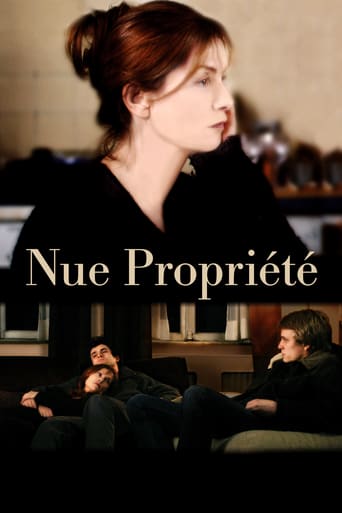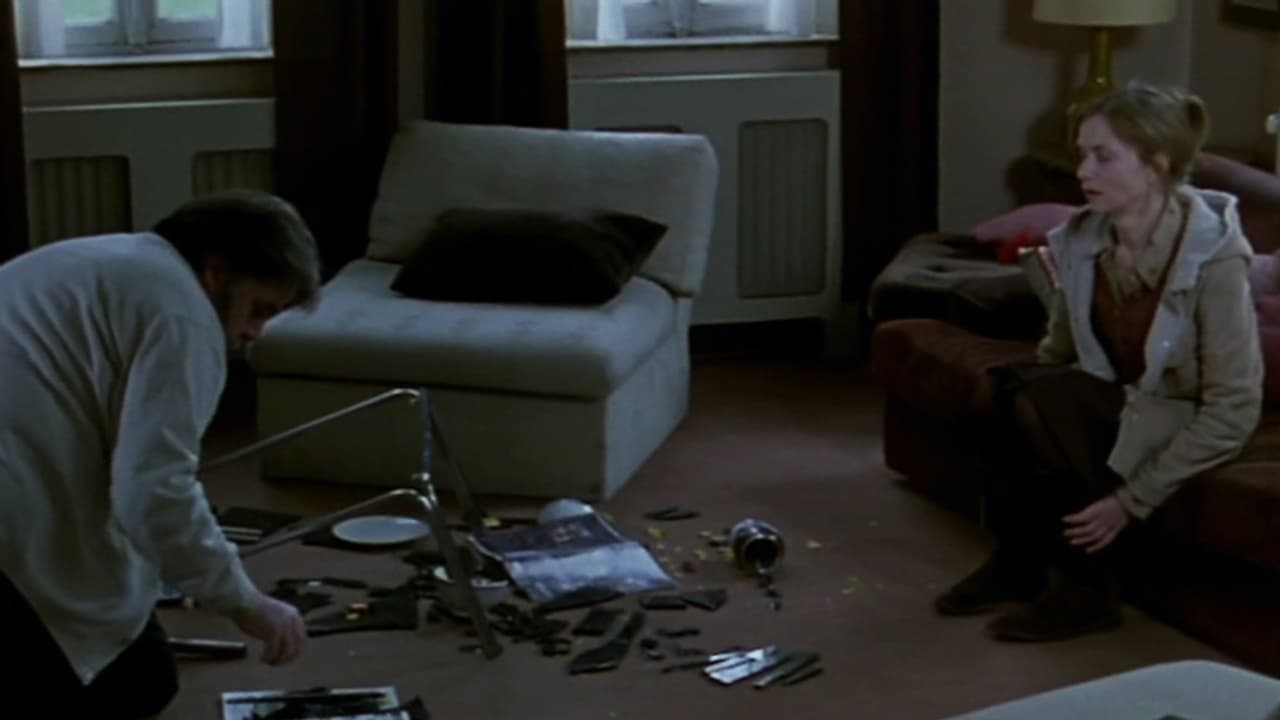Sindre Kaspersen
Belgian screenwriter and director Joachim Lafosse's third feature film which he co-wrote with Belgian screenwriter Francois Pirot and Iranian screenwriter and director Philippe Blasband, premiered In competition at the 63rd Venice Film Festival in 2006, was screened in the Special Presentations section at the 27th Toronto International Film Festival in 2006, was shot on location in Belgium and is a Belgium-France-Luxembourg co-production which was produced by producer Joseph Rouschop. It tells the story about a mother named Pascale who lives in a house in a commune in Belgium with her two sons named Thierry and Francois. Pascale is barely on speaking terms with Thierry and Francois' father named Luc whom she divorced a decade earlier and is secretly having a relationship with her Flemish neighbour named Jan whom is encouraging her to sell her house and move away with him, but when Pascale begins expressing her future plans to Thierry and Francois she gets nothing but resistance. Distinctly and precisely directed by Belgian filmmaker Joachim Lafosse, this finely paced fictional tale which is narrated from multiple viewpoints, draws a dense and objectively heartrending portrayal of a father whom is almost being prohibited from visiting his two sons, a mother whom is getting inspirations from her lover which could affect the lives of her children and her relationship with them and a heartily relationship between two close to inseparable twin brothers who are very pleased with living with their mother and kidding around with her. While notable for it's naturalistic milieu depictions, sterling cinematography by cinematographer Hichame Alaouil, production design by production designer Anna Falguères and use of sound and colors, this dialog-driven story about conflicts of will and compromises within family relations where a woman whom has gotten the house her former husband bought and both of their boys to herself begins to consider leaving her job, her infants and her home which belongs as much to them as it does to her, depicts two involving studies of character and contains a timely instrumental score. This authentic, at times humorous, cinematographic and reverently humane drama from the late 2000s which is set mostly on a grand property nearby a town in Belgium and where the idea of selling a family house and the introduction of a new man causes a student to revolt against his mother and proclaim what he and his brother whom is polishing doors is entitled to, is impelled and reinforced by it's refined narrative structure, subtle character development and continuity, moral and psychological undertones, distinguished style of filmmaking, comment by Luc : "We just tried, and it didn't work out. That's all." and the poignant acting performances by French actress Isabelle Huppert, Belgian actors Jérémie Renier, Yannick Renier and Patrick Descamps, Belgian actress Raphaëlle Lubansu and Flemish actor Kris Cuppens. A quietly atmospheric and incisively sociological character piece which gained the SIGNIS Award - Honorable Mention Joachim Lafosse at the 63rd Venice Film Festival in 2006.
eldino33
In my opinion, "Nue propriete" contains universal images which create a dramatic tension that is never absent from the film. There is, thank goodness, no comic relief to detract from the dire positions of the characters. Also, there are no mindless subplots which cause the characters to wander off in aimless directions. The most obvious classical theme, some would say biblical theme, is that of Cain and Abel, with Thierry as Cain. A modern reflection of OEDIPIUS REX is very obvious. Alas, poor Thierry is also somewhat like Hamlet, especially with Hamlet's insult of Gertrude in Shakespeare's bedroom scene, where the female parent is accosted by a barrage of language befitting a brothel. The Thierry-Hamlet image is manifest in the relation between Thierry and his girl friend, as with Hamlet and Ophelia. Thierry's hatred is also aimed toward Jan, his mother's new partner, much like Hamlet's dislike for his new father Claudius. Pascale, the mother in the film, reminds one of Nora in Ibsen's A DOLL HOUSE. Both women want out. The acting in "Nue propriete" is very good, the direction is a above average. This film is well worth seeing.
Roland E. Zwick
The French film, "Private Property," sets up a fierce battle of wills between a divorced mother and the two ne'er-do-well sons (fraternal twins) who still live with her. Pascale wants to sell the house and open up a bed-and-breakfast with her new boyfriend, but the young men, fearing the loss of the property that they believe should rightly go to them, attempt to block any efforts in that direction.With intelligent direction by Joachim Lafosse and incisive writing by Lafosse and Francois Pirot, this low-keyed family drama explores the complexities inherent in filial, sibling and marital relationships. The confrontation scenes, many of which take place during meal times (come to think of it, I don't believe I've seen this much eating in a film since "Babette's Feast"), are sharply drawn and effectively staged. The acting is excellent across the board, particularly that of Isabelle Huppert, as the middle-aged woman determined to finally start living for herself, and Jeremy Renier, as the more belligerent and self-centered of her two sons. Yannick Renier, Jeremy's brother in real life, is also very good as the more passive of the twins.Some viewers may feel let down and frustrated by the inconclusive ending, but I enjoyed the ambiguity of it. We have been made privy to just one brief episode in the lives of these people - then it's time for us to move on.
darkosilencIO
This movie is an example of perfect psychological drama that only the French (actually the director is Belgian) can write and direct in such an essential and powerful way.SPOILERS FOLLOWING Focusing on two twin brothers conceived by a divorced couple, the film is a very serious study on the dynamics between a mother (Isabelle Huppert) and her two bi-ovular twin sons (Renier twins). The threesome, since the moment of the divorce, lives intimately isolated in a great house in the middle of the country in Luxembourg. The two brothers are complete adults but unemployed. The quiet one is good at fixing things in the house, the loud one is good at doing nothing but kissing and having sex with a girlfriend he sees instead of going to the university classes. Mother is distressed because she's run out of money and, encouraged by her new lover, she wants to sell the family house her ex-husband offered as a precaution for the kids to invest on a green house. Of course, the troubled son makes a violent stand and starts treating her mother really badly until she decides to go away for a period and leave the guys alone in order to make them realize they're not little boys anymore. The ex-husband is a quiet and loving man who chose to marry a second time and had a third children with an other woman after Pascale (Isabelle Huppert) left him. For she is a woman, she is not able to confront her two male grown-up children (there is sexual tension between them also) and the ghost of her ex-husband. Her new lover doesn't want to interfere and draws back, leaving her alone. Pascale doesn't want her ex-husband to show his face and interfere in her personal relationship with the boys, but when she elopes she announces him that it's time that he takes care of them because she is exhausted and wants a new life. The father avenges and refuses to go and keep an eye on them because he thinks they're mature enough. He couldn't be more wrong! As the boys are home alone, their relationship suddenly cracks and in a moment of foolish and immature rage, the blond one fights him until leaving him unconscious. As soon as he realizes what he's done, he calls their father but he prefers escaping instead of confronting the family. When the family is reunited, in the end, we are left unable to know what are the conditions of the hospitalized brother (he could be dead or alive, we are not given any clue for this) and mother/father/child have their violent climax moment where the troubled son blames her mother for divorcing and ruining his family life. The father simply explains that things were not meant to keep them together and Thierry eventually moves on and grows. The last sequence is a series of shots in the house as it is emptied and sold to new owners. We move on the country roads near the house backwards as if Thierry's family history was to be removed necessarily.The movie is very dramatic although the real dramatic moment comes in the end as a truly unexpected punch in your stomach. Some may find it too educational and deprived of visual and inventive power, but that's not the intention. Frnech movies are usually quite simple and classic and focusing on psychology and more thoughtful themes. Each performance is worthy of applause, especially Jeremie Renier (already seen in another great performance a few years ago in CRIMINAL LOVERS by Francois Ozon) and the evergreen Isabelle Huppert.


 AD
AD



